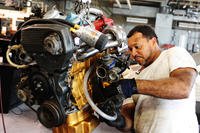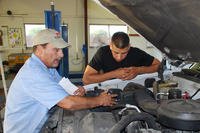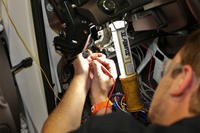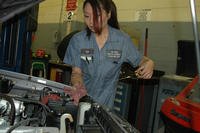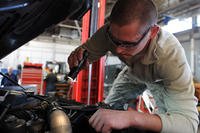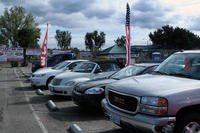If you're considering buying a new set of wheels, this list will help you weigh the advantages and disadvantages of diesel-powered vehicles.
Car smarts: To help you accurately compare diesel vehicles with traditional gasolinepowered and alternatively fueled vehicles, here are some commonly heldpositive and negative beliefs about diesels, plus some facts to consider:
PRO: Diesels get great mileage. This is true; they typically deliver 25 to 30 percent better fuel economy than similarly performing gasoline engines. Diesels also can deliver as much or more fuel economy than traditional gasoline- electric hybrids, depending on the models involved and whatever rapidlydeveloping automotive technology achieves.
CON: Although diesel fuel used to be cheaper than gasoline, it now often costs the same amount or more. Diesel fuel is also used for commercial trucks, home and industrial generators, and heating oil, so as demand for diesel passenger vehicles grows, the price of diesel fuel is likely to continue to rise because of competition from those other users.
BUT: Even if the price goes up, diesel fuel would have to be 25 to 30 percent more expensive than gas to erase the cost advantage of a diesel engine's greater fuel efficiency.
PRO: Diesel fuel is one of the most efficient and energy dense fuels available today. Because it contains more usable energy than gasoline, it delivers better fuel economy.
CON: Although diesel fuel is considered more efficient because it converts heat into energy rather than sending the heat out the tailpipe as gas-powered vehicles do, it doesn't result in flashy high-speed performance. In some ways, a gasoline-powered engine is like a racehorse — high-strung, fiery, and fast — whereas a diesel engine is more like a workhorse — slower, stronger, and more enduring.
BUT: Because of the way it burns fuel, a diesel engine provides far more torque to the driveshaft than does a gasoline engine. As a result, most modern diesel passenger cars are much faster from a standing start than their gas-powered counterparts. Diesels with manual transmissions usually don't have to be downshifted to easily pass other vehicles on the highway, and although they don't reach the highest speeds of gasoline-powered cars, many diesels still can cruise quite handily at 100 miles per hour or more (providing you can find a place to do that legally!). What's more, diesel-powered trucks, SUVs, and cars also can out-tow gas-powered vehicles while still delivering that improved fuel economy.
PRO: Diesels have no spark plugs or distributors. Therefore, they never need ignition tune-ups.
CON: Diesels still need regular maintenance to keep them running. You have to change the oil and the air, oil, and fuel filters. Cleaner diesel fuels no longer require you to bleed excess water out of the system, but many vehicles still have water separators that need to be emptied manually.
PRO: Diesel engines are built more ruggedly to withstand the rigors of higher compression. Consequently, they usually go much longer than gas-powered vehicles before they require major repairs. Mercedes-Benz holds the longevity record with several vehicles clocking more than 900,000 miles on their original engines! You may not want to hang onto the same vehicle for 900,000 miles, but longevity and dependability like that can sure help with trade-in andresale values.
CON: If you neglect the maintenance and the fuel injection system breaks down, you may have to pay a diesel mechanic more money to get things unsnaggled than you would to repair a gasoline system because diesel engines are more technologically advanced.
BUT: All types of vehicles need maintenance, and the increasing complexity of both traditional and alternative vehicles may require repair by specialized technicians that work at higher rates than the mechanics at your neighborhood garage.
Diesel technology is constantly being improved. Government pressure to produce low-emission diesel engines for passenger vehicles, trucks, buses, and farm and construction equipment has resulted not only in low-sulfur diesel fuels but also specialized catalytic converters, advanced filters, and other devices to cut down or destroy toxic emissions. There are also dual-fuel engines that run on natural gas but can switch to diesel if the gas supply runs out. To reduce dependency on dwindling supplies of petroleum, biodiesel fuels derived from agricultural and commercial sources are being developed. The section "Diesel fuel" later in this chapter tells you more about them.
From Auto Repair for Dummies, copyright © 2009 by Wiley Publishing, Inc., Indianapolis, Indiana. Used by arrangement with John Wiley & Sons, Inc.





